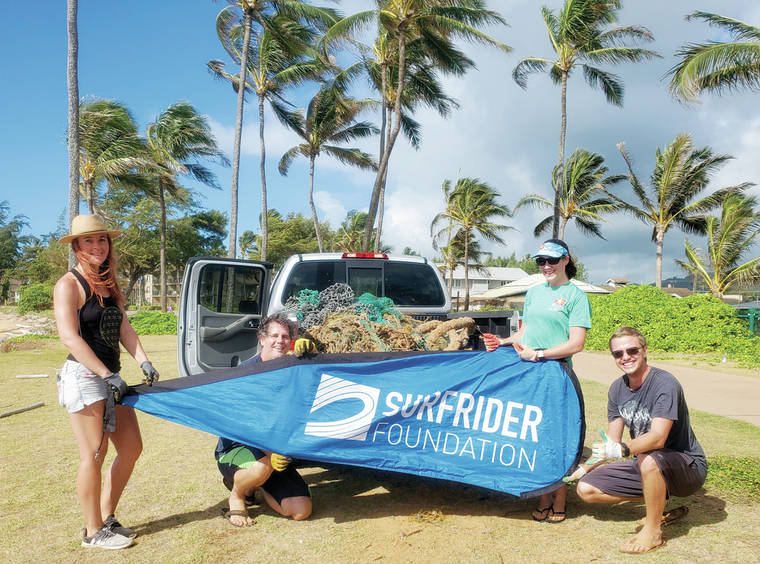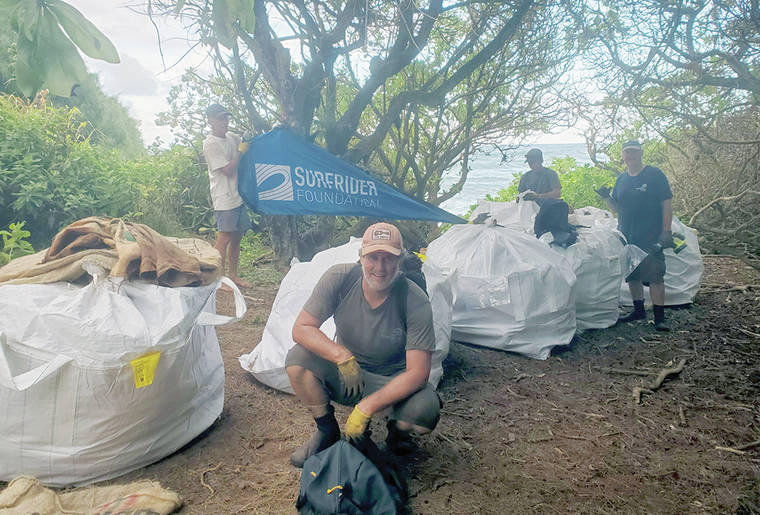LIHU‘E — With a depleted group of volunteers because of COVID-19, the Surfrider Foundation continues to conduct giant Net Patrols every Wednesday.
Consisting of a core group of eight to 12 volunteers who work with five Jack Harter Helicopters employees when they are not flying helicopters, their Net Patrols range from three to 20, depending on individual availability.
The group, which started back the first Wednesday in June after stopping due to COVID-19 restrictions, gathers at the south side of Moloa‘a Bay for three hours of work together to make this happen.
They collect nets and other debris using “Super Sacks” six feet tall and four feet wide. Since January, they have removed 82,189 pounds of debris, which is sent to the Garden Isle Disposal in Nawiliwili.
It includes derelict fishing nets abandoned from coastal regions such as Alaska, Asia, Japan and Seattle.
They collect about 35 Super Sacks each time they journey to the shoreline. Each weighs anywhere from 100 to 250 pounds.
The Surfrider Foundation volunteers work with Jack Harter Helicopters employees. The company has paused island tours due to the COVID-19 shutdown.
The Surfrider Foundation Kaua‘i Chapter and Executive Member Scott McCubbins, partnering with Barbara Wiedner’s Net Patrol group, are literally on call if someone contacts them on the support hotline.
Found in the nets are items that take decades, if not hundreds of years, to decompose. “If someone sees a net, we will go on patrol right on the spot,” McCubbins said.
“We will remove the net if we can access it.” The crew has found objects such as plastic pipes, fishing baskets, and buckets mostly produced from the fishing industry, according to Wiedner.
The Global Ghost Gear Initiative recently reported on its Facebook page that the Surfrider Foundation is part of an international group. A significant percentage of the 100,000 pounds of debris removed annually, 80% to 85% of it, comes from the fishing industry.
Other non-biodegradable material includes toothbrushes. During a recent cleanup, Wiedner said her crew picked up a total of eight toothbrushes, a bio-hazard because of the type of plastic that can take hundreds of years to decompose.
“Of that 100,000 pounds of debris removed every year, 50% of that weight is plastic buoys, jugs, bins and heavy plastic fishing traps and oysters spacers,” Wiedner said.
The fishing nets aren’t just harmful to the environment, but also marine life that patrols the delicate ocean ecosystem.
“We are removing plastics, and they will be less if we can get it off the beach,” Wiedner said. “A high tide can’t take a net out. It can affect fish and birds, who think they are food. Dolphins, turtles and monk seals can all get tangled in those nets.”
One way Wiedner said people can help reduce the amount of non-biodegradable plastics floating in the ocean is by reducing the amount of plastic consumed.
“We pick up stuff, and we don’t even know how long it has been in the ocean,” Wiedner said. “I’ve picked up bottles from the mid-’80s, and it was faded, but was completely intact inside the Styrofoam. It doesn’t go away.”
For more information on the Surfrider Foundation or volunteer opportunities, contact Wiedner at 635-2593.
•••
Jason Blasco, sports reporter, can be reached at 245-0437 or jblasco@thegardenisland.com.






Bless these super volunteers! Jack Harter took us on the ride of our life on our first visit to Kauai in 1979. Glad to see his company Is still doing great things!